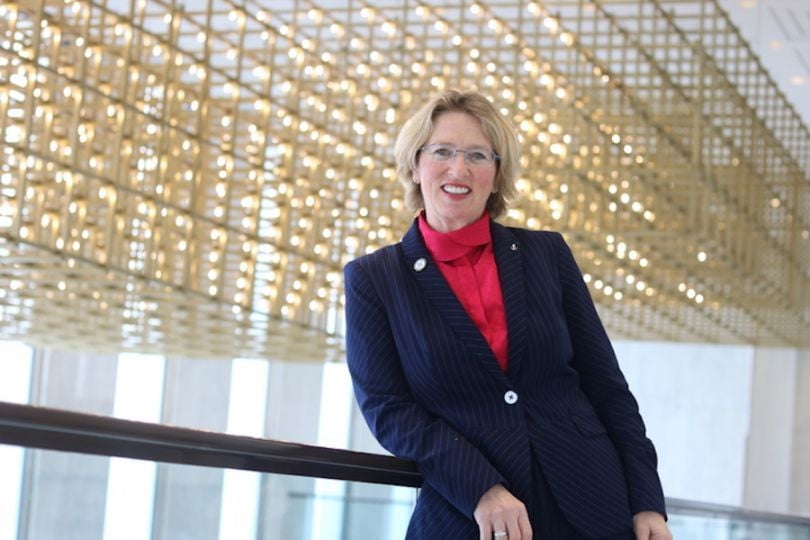According to a report from Hewlett-Packard, men apply for a job when they meet only 60 percent of the qualifications, but women apply only if they meet 100 percent of them.
While some articles responding to this study have suggested women need more confidence in their abilities, the report’s data speaks for itself: both women and men’s most common reason for not applying to jobs they weren’t 100 percent qualified for was that they didn’t think they would be hired since they didn’t meet the qualifications and didn’t want to waste their time and energy.
What this actually highlights, as pointed out in an insightful HBR article, is that many women might not understand the impact influential relationships, self-advocacy, and even a creative framing of one’s previous work experience can have on one’s ability to get hired. Maybe the most exciting takeaway is that “following the guidelines” doesn’t always pay off. And sometimes, playing the game differently does.
According to women tech professionals across the United States, effective self-advocacy begins with women understanding and communicating their professional strengths to peers, mentors, leaders, and yes, future employers.
But championing yourself takes time.
“The self-advocacy conversations I had came after building up skills, solidifying relationships and learning the business,” Anne Zelenka, director of engineering at personal growth platform Gloo, said.
And from Amanda Lee, VP of corporate communications at Pax8, a company that simplifies buying and selling in the cloud: “This did not happen overnight. Over the years, I had built trust and a reputation as a problem-solver and someone willing to put the work in. It is about driving results, following through, and doing what you say you will do.”
Learn more strategies for effective self-advocacy from the following 38 women working in tech.
How to Advocate For Yourself
- Speak up, ask for what you want
- Show pride in your work, don't downplay accomplishments
- Add visibility to your work through lunch and learns or workshops
- Create physical, transparent records of your work such as status reports you can share across teams
- Don't be afraid to leave and find a role where you're valued
Crunchyroll
Rachel Sbano
PRINCIPAL TECHNICAL PROGRAM MANAGER

How Sbano overcame past fears or doubts about advocating for herself: I believe that there is a difference between arrogance and confidence. It is important to embrace that confidence and speak up when we find ourselves in positions where we feel capable of taking on the role, offering an opinion or leading an effort. I might not always be the first in the conversation to speak up, but I will not hesitate to make my opinion and voice heard, even in a meeting where I am the only woman.
It is easy to feel hesitant, especially if someone speaks up first and makes a play for the opportunity. In meetings, I acknowledge other people’s stance on a topic and make my opinion known. Depending on the audience, I’ve also backed requests for task or project ownership with objective reasoning.
Her advice for women who may feel like their contributions are being overlooked: Be your own advocate. Speak up directly in circumstances where you feel like you contributed. If you are hesitant to do this, start in smaller environments where you feel more secure. If your team has retrospectives, use a moment to acknowledge one of your contributions by focusing on the outcome you achieved or the value your work added. This practice helps me counter the feeling of coming across as arrogant.
How she thinks of self-advocacy: I hesitate to state absolutes, but when done with tact and professionalism, self-advocacy always pays off. When I advocate for myself, I often do so with a clear outcome in mind. I approach the conversation with an objective and use my accomplishments or opinion of my abilities as evidence to support it. As a result, I’ve been promoted and received support that I needed.
I also think that it’s important to advocate for others. We are all here to support each other. Some of us are at different places in our careers and lives. Having someone help give you a small boost often makes all the difference. Having confidence and advocating for yourself is not about putting others down or letting others be silenced. It’s our responsibility to help each other and speak up so that someday, we can all find the confidence to speak for ourselves.
Glu Mobile
Heather Messegee-Dawson
ART DIRECTOR, COVET FASHION

Biggest self-advocacy hurdle: In previous roles, I lacked the confidence to speak up. As a designer, artist and director, the most effective way to promote your abilities and accomplishments is to present your work. So I signed up for every class in communication, presentation skills and improv that I could find. I have even volunteered to present to large groups because doing so used to terrify me.
After years of practice with presentations and meetings, it’s now second nature. I even find it energizing. I’ve also been able to get past my fears with the support of wonderful work friends and colleagues. If I ever feel the fear of self-advocacy creep back, then I have a great support system to lean on.
Her advice for women who feel like their contributions are being overlooked: Try changing how you surface your work. Find new ways to share your accomplishments, get help from work friends and colleagues or change how you communicate with others. Start by emphasizing how you’re making an impact in your one-on-ones with your manager. Work your way up to presenting your work at team meetings and discipline guilds.
The journey of self-advocacy doesn’t have to be traveled alone. Your manager can champion your work up to leadership teams. Colleagues can be a source of emotional support in meetings. Co-workers can introduce you to the right people to help move your project forward.
Sometimes it can simply be a matter of adapting your communication style. If you’re not getting the results by sending emails, try setting up a meeting to share how your work has helped the team or product. If you’re speaking with a busy executive, be as concise and informative as possible with your allotted time. And if you’re talking to someone who is laser-focused on data, then tailor your conversation to show your contributions through data and results.
A time when speaking up paid off for her: At a previous job, I worked as a team leader helping design successful live-ops features and optimizing our pre-production processes. One year, while working on annual bonuses, I realized that one of my direct report independent contractors was earning more than I was. I had no issue with his salary. He was talented and experienced. However, it made me realize that my salary was not reflective of the value and impact that I brought to the studio.
In the next one-on-one with my manager, I came prepared with objective facts and shared how I felt about the situation. I was anxious, but I stayed calm and collected because I had practiced ahead of time. My manager agreed that it did not look great that a direct report was making more than I was and said he would follow up.
A few days later, our studio’s creative director pulled me aside to share that I was being given a huge raise. I was grateful for the swift action. I was also thankful that I stood up for myself. From that experience, I learned that self-advocacy can literally pay off in a big way.
KeepTruckin
Kelly González
DIRECTOR OF EMPLOYEE EXPERIENCE

How González advocates for herself: I am usually able to be matter-of-fact about my accomplishments and, when needed, use wit and humor to promote myself. Advocating for oneself only comes off as arrogant if those statements can’t be backed up with facts, data and follow-through. I also do my best to balance personal praise with recognition for my teammates.
I definitely have insecure moments. I get over those instances pretty quickly with the support of my personal board of directors. They help keep my ego in check and build me up when I need it.
Her advice for women who feel like their contributions are being overlooked: Spend time reflecting, defining and developing your personal brand. If you were marketing yourself as a product, what would you need to do to increase visibility and trust? Do you have an elevator pitch that quickly describes your role and the impact you’ve had on the company?
Have informal virtual watercooler breaks with various leaders in the company. Ask them what problems they are trying to solve and wherever possible, be their solution. Discuss your goals and accomplishments with everyone.
Don’t wait for someone to ask you or magically know what it is you’re looking for. Talk about problems you have already solved, their impact and your goals. Remember that anyone can be your sponsor. They just need to be in a decision-making room and mention your name for a stretch project, new role or other type of recognition.
A time when self-advocacy paid off for her: A while back, the company I was working for decided to move the customer service call center I helped build to Las Vegas. I was positioned to be out of a job in short order if I didn’t want to move as well. I knew that our employees were our secret sauce. They needed more help to be engaged, developed and successful in their careers. I identified a gap that I could easily fill. I went directly to the COO and told him I was interested in helping HR, even though I had no HR experience other than managing employees. I also told the VP of engineering, the VP of HR and the VP of sales. I shared the very specific problems with our employee experience and the specific strategies I could implement to fix them.
I knew that if we didn’t fix those issues, we wouldn’t succeed as a company. I moved into HR a week or two later. I learned that problem-solving was just one piece of the puzzle. Without sharing with leaders that I understood the impact of those problems and had concrete solutions, my aspirations would not have come to fruition.
Ginger
Vasudha Mithal
HEAD OF CLINICAL PRODUCTS

How Mithal overcame past fears or doubts about advocating for herself: It boils down to three things for me: building self-awareness, owning your work and finding your advocates. Understand where your hesitation to speak up is coming from. I realized a lot of mine was implicit in my culture. We are told not to speak out loud or contradict what elders say. I have been told to “act like a girl.” Identifying the root of insecurity helped me better combat the embodied cultural norms and play on my competencies instead.
To combat coming off as arrogant, go with a growth mindset. Even as you talk about your accomplishments, acknowledge what you don’t know. Always be learning. I gain a lot of positive energy by speaking with my colleagues who really know about my work.
Her advice for women who may feel like their contributions are being overlooked: It’s natural to feel frustrated if you don’t get the proper acknowledgement for your work. I find this three-step framework to be helpful: Start by acknowledging the emotion. Recognize and feel your emotions. Allow yourself to feel frustrated. Then, label what you are feeling. Finally, communicate. Identify who you should speak with and why. Start by communicating with those who would advocate for you to build your confidence. Then move toward the harder audience.
A time when self-advocacy paid off for her: In one of my roles, I wanted to advocate to leadership that I was fit to drive a pretty meaty project. I also wanted to get funding for a larger team in order to drive that project. To start this conversation, I reflected upon the success of my previous projects. I also got feedback and support from my immediate colleagues regarding the business value of the proposal. With the support of my colleagues, we were able to get the project approved and resourced.
Taking the first step is difficult. But usually, the path becomes clearer as you start having these conversations.
Webflow
Linda Pham
GROUP PRODUCT MANAGER

How Pham advocates for herself: It took becoming a manager to recognize the actual responsibilities of one. Previously, I thought my manager was there to corral the troops and make sure we got things done. While this is part of the job, when I became a manager, I realized how much of my time was actually spent making sure my reports were heard, recognized and given opportunities to grow in their careers.
It takes a lot of work for managers to know about everything that’s going on in a report’s day-to-day and near impossible for them to read their minds. I’ve had reports who will tell me point-blank what they’ve achieved and exactly how they would like to grow in the company. I’ve also had reports who kept it bundled up. The latter required the most work. I had to dig to learn about their motivations, their achievements and, most importantly, their expectations and goals.
Most managers have good intentions. They may just not realize that they needed to dig to find out more about their reports. Your manager wants to be your advocate. Help them do so by telling them what they should be advocating for.
Pham’s advice for women who may feel like their contributions are being overlooked: I think we all hope that we will be automatically recognized. But sometimes, that doesn’t happen. Is it because your achievements are hidden? Does your manager assume you don’t like public validation? Whatever the reason, attack it straight on. Also, remember you can always rely on self-advocacy. And if you’re not comfortable with it, connect with one of your close peers in the office and have them give you public props. Just don’t forget to return the favor.
Sidney Ehrenborg
QUALITY SPECIALIST

A time when self-advocacy paid off for Ehrenborg: Actually, getting my job at Webflow. I was at a conference in San Francisco for my former job and I wasn’t actually looking for a new role at the time. But I heard about the company and it piqued my curiosity. I talked to two Webflow employees about the work I was doing and projects I was interested in. We also discussed the no-code movement and all of the potential for the future and the company. I realized that in my excitement about no code and what the company itself was doing, I didn’t have time to feel anxious or nervous. I just presented myself as I was, and that ended up being enough.
Virta Health
Neha Shevade
ENGINEERING DIRECTOR

How Shevade views self-advocacy: Before advocating for yourself, think through what you are advocating for and why you believe you need to highlight your abilities and accomplishments. Once you have specific examples of your experience, frame the message in a way that will be heard. When you are ready to deliver the message, be polite but stern. Don’t be afraid to stand your ground as long as you do so respectfully and politely.
Lastly, don’t put all the onus on yourself. As long as you believe you did the right thing, how others perceive it shouldn’t matter.
Her advice for women who may feel like their contributions are being overlooked: Think through why you feel like your contributions are being overlooked. If you feel someone else is getting credit or taking credit for your work, engage an ally from your team and do a sanity check. Sometimes, other folks can help identify your blind spots for you. Come armed with specific examples of how your contributions are being overlooked, collect feedback and come up with a plan. Sometimes peers aren’t trying to be malicious. It might simply have slipped under a manager’s radar.
If you feel like your contributions are being overlooked because you see opportunities passing by you to other members on the team, reflect on whether your work is visible to your team. As women, we tend to downplay some of the important work we do. Think of the different ways you can add visibility to your work. I personally like to establish myself as an expert in a certain part of the stack by hosting lunch and learns or workshops.
If you are already doing all of the above, have an honest conversation with your manager and tell them how you feel and why. Come armed with some potential solutions that you think would resolve the issues. Most managers want only the best for their team-members and will appreciate the honest constructive feedback.
A time when self-advocacy paid off for her: At a previous company, my manager moved on to start his own business, so we started a search for his replacement. This role required management during a time when native mobile engineering was based on Objective C and Java. Skill sets were niche, the job market was booming and the talent pool was limited and expensive.
I checked all the boxes on the job description in terms of requirements except management experience. I saw multiple candidates get rejected for not having the right technical chops. Frustrated with all the interviewing, I asked my ex-manager’s boss for the opportunity to try it out. To my surprise, he looked relieved. It turns out, he was just as frustrated with interviewing as I was. He was happy to put in the time to develop someone internally for this role rather than hire from outside.
Honeybee Health
Sarah Mayo
DIRECTOR OF PATIENT SERVICES

Sarah Mayo stresses objective communication in self-advocacy. The director of patient services at online pharmacy Honeybee Health said speaking impartially to leaders and co-workers about their accomplishments and goals can help women get what they deserve.
How Mayo overcame a fear of self-advocacy: I learned to trust in my work and let it be the foundation on which I advocate for myself and others. Letting the work speak for itself is not enough on its own. But a person knowing their worth and the value they bring can help alleviate fears of how they may be perceived.
Advocacy isn’t just about being a leader but also elevating others. It creates shared strength and develops a community to share in victory. The people that advocate on your behalf can be your best advocates. Those other advocates can help drive your success on days when you don’t have the strength to fight for yourself. The longer you let the fear of advocating for yourself linger, the harder it is to do gracefully.
Advocacy isn’t just about being a leader but also elevating others.”
When self-advocacy paid off: I was a part of a decision-making process on a topic that was dear to me. I had strong opinions rooted in personal experience. When putting my case together, I removed personal experiences to make it accessible and logic-based. Throughout multiple meetings, I drove the initiative home and was ultimately successful in gaining the support to implement it. However, I worked at it a little more than I needed to.
I learned that when introducing a new idea, people occasionally need time to process the information, so take a beat to reflect on your effectiveness and re-read the room. While my idea wasn’t ideally received the first time, it doesn’t mean I wasn’t heard, which is often half the battle to begin with.
Advice for those who may be overlooked: Do a self-audit. Ask whether your contributions are recognized in a way that they haven’t seen or what type of acknowledgment would make you feel differently. Define what “enough” looks like. Then have the conversation based on those needs. Direct communication is almost always better than making an assumption about how a person’s value is received. Talk to managers and team members about what’s missing and see if they can provide it. If after doing the work you’re still not getting what you need, evaluate whether it’s time to move to a healthier environment.
N3TWORK
Catherine Silvestre
PRODUCT OWNER

Mentors can be excellent sources of professional knowledge. Catherine Silvestre, product owner at game publisher N3TWORK, recommends women find two mentors: one to assist with company-specific challenges and another for more general professional support.
How Silvestre overcame a fear of self-advocacy: As a product leader, I need to advocate not only for myself but also for my team. Finding the courage and approach to advocacy is something I struggle with constantly. I want to make sure my voice is heard in a way that the listener will receive.
About five years ago, I realized that I was often holding back in meetings for fear of how my comments might be taken. Fortunately, I had a co-worker say, “They want your perspective or they would not have hired you.” Then I worked on my confidence to speak up and found ways to ensure my message was received. It’s been a long process, and in all honesty, I’m still working on it.
We always need to ask for what we want, in a way that is true to ourselves.”
When self-advocacy paid off: A friend’s experience taught me a lesson. She was running a department on her own with no support from management and with no recognition for the work. She put a presentation together for leadership on why she deserved both a title and salary increase. She did it in her playful tone, but used research and asked for what she deserved.
Initially, I was surprised at everything she requested because it’s been ingrained in many of us that asking for too much might offend someone. But I soon realized we always need to ask for what we want, in a way that is true to ourselves. Otherwise, we will never get what we deserve.
Advice for those who may be overlooked: The most important thing is to be authentic. You can always work on how a message is crafted, but it’s important that the message is coming from a place that is true to who you are, not something you think others want you to be. Also, come prepared with facts. Keep conversations about objective results and remove biases.
I highly recommend finding mentorship both inside and outside of the company. An internal mentor can provide guidance on how to navigate systems unique to your company. While an outside mentor can help with more neutral guidance and give industry-wide perspectives. Don’t be afraid to ask for help from people you trust.
A GAME OF SELF-ADVOCACY:
At the 2019 Emmys, two actresses from the hit HBO show “Game of Thrones” submitted their names for awards consideration, after HBO declined to do so. Gwendoline Christie, who played Brienne of Tarth, threw her hat in the ring for best supporting actress in a drama series, while Carice van Houten, who played Melisandre, put herself up for best guest actress in a drama series. Both women went on to get the nominations.
DISQO
Anne Rynearson
SENIOR PRODUCT MANAGER

“I learned that self-advocacy can lead to opportunities that bring me to the next level in my career,” said Anne Rynearson, senior product manager at data insights platform DISQO.
Speaking up for herself — in an environment that welcomed it — helped Rynearson advance her skills and reach her potential.
How Rynearson overcame a fear of self-advocacy: I tackle my fear of coming across as arrogant by reminding myself that I want to work with and for the type of people who will respond well to self-advocates. If promoting my accomplishments and abilities isn’t well-received, that’s a sign that this isn’t an environment I want to spend time in.
Additionally, I recognized that my self-advocacy is rooted in a desire to have a positive impact and help those around me. People are much more likely to appreciate self-promotion — rather than finding it boastful — if that promotion helps them and fosters a culture of mutual acknowledgement and appreciation.
Fear of self-promotion can hold you back from reaching your full potential.”
When self-advocacy paid off: My first manager told me, “If an opportunity scares you, that means you should pursue it.” Applying for jobs or taking on projects outside our comfort zone is a great way to grow. The best way to get involved with such opportunities is to self-advocate.
I asked my manager if I could conduct user research on our product. The company I was working for hadn’t done any user interviews on an upcoming product, and I didn’t have a background in research. So taking this project on meant a lot of learning and work. Conducting the research taught me more about the kind of work I wanted to do in the future.
Advice for those who may be overlooked: Consider whether you’re being overlooked because you haven’t been promoting yourself and other contributions. Managers and leaders need people to let them know when they’ve done something worth knowing. Fear of self-promotion can hold you back from reaching your full potential.
When discussing accomplishments, provide the context around why what was done is important, including quantifying contributions, just like on a resume. Acknowledge the accomplishments of others. And if steps are taken and contributions are still overlooked because of politics or an unhealthy work culture, consider moving onto a different company.
DISQO is Hiring | View 10 Jobs
3PL Central
Rachel Trindade
CHIEF MARKETING OFFICER

Fostering a network of self-advocates helped Chief Marketing Officer Rachel Trindade grow in her career. In fact, the leader at warehouse management system provider 3PL Central said her colleagues even teed her up to discuss her wins in meetings so she could practice more self-advocacy.
How Trindade overcame a fear of self-advocacy: Sometimes it feels awkward sharing accomplishments, but if a person doesn’t advocate for themself, often no one else will. I started asking myself, “Am I bragging or just stating facts?” If I increased lead volume by 50 percent, then that’s a fact worthy of sharing.
The best advice I ever received was, “Always ask for the order.” It sounds related to sales but applies to everything in life. You can’t get what you want if you don’t ask. Take the fear out of “no.” When someone compliments you for doing something well, share it with your manager then file it in a special folder. Sometimes it’s easier to use someone else’s words when you advocate for yourself. Imagine using awesome quotes from all of your colleagues as you fill out a performance review.
Sometimes it’s easier to use someone else’s words when you advocate for yourself.”
When self-advocacy paid off: Years ago, I was seeking a promotion. I met with our VP of HR, VP of ops and our CEO to talk about my aspirations, why I was ready for the next move and to get feedback on my options. Each person encouraged me to explore my interests and brought me new opportunities in other departments. When an opportunity intersected with my skills and interests, I applied and was promoted to the director of sales ops. I learned that vocalizing what I want and asking for support in advance can open up new opportunities.
Advice for those who may be overlooked: Have a conversation with a manager. Ask them their impression of your work. Tell them that you feel like your accomplishments get overlooked. Use specific examples of projects or programs where you feel like your work deserved recognition and ask them for what you want.
If they don’t agree, ask for specifics and understand what they view as success. Regardless of how it goes, you will know where you stand. If you don’t see a path to recognition and appreciation, know that other companies and leaders will value your efforts, and consider making a move.
Lucky Day
Stephanie Drejerwski
HR GENERALIST

Stephanie Drejerwski wants women to keep using their voices. The HR generalist at gaming app Lucky Day said women should keep making their accomplishments and goals heard. And if they’re being silenced, find a company that will amplify their work.
How Drejerwski overcame a fear of self-advocacy: I never feared coming off as arrogant or entitled. However, I know that others have perceived me in such a way. I think my issue is allowing others to make me second-guess myself. To get past that, I’m always prepared to be told I’m wrong.
It’s a shame that I and many other women have to prepare to be told “no,” but it’s helping me understand business beyond my roles. At a previous company, I was told that there was no growth for me, but I continued to do more than my role required. I kept voicing my opinions and learning new skills, and it prepared me for a new company that appreciated me more.
I can do anything when I stop second-guessing my abilities.”
When self-advocacy paid off: When I started in HR, I attended weekly meetings with little to contribute. Eventually, that changed and I was added to projects. This change led me to creating the company’s volunteer program. I learned two things: I can do anything when I stop second-guessing my abilities and that I was capable of contributing long before I felt comfortable enough to speak up.
Men in tech don’t wait until they know every detail before sharing their ideas and opinions, so why should women? I think women have been silenced for so long that they lose confidence in the workplace. The best thing for us to continue doing is to use our voices.
Advice for those who may be overlooked: Where a person is now isn’t the end of the road. If you are consistently being overlooked or ignored, go somewhere where you will be appreciated. Women are needed in tech. You will be appreciated and heard elsewhere. Keep speaking up. A woman’s ideas and skills are important and needed.
Tango Card
Jessica Buerkle
SALES TEAM MANAGER

Sales Team Manager Jessica Buerkle compares the feeling of closing a sale to that of making an important play during a sporting event. She and Tango Card colleague Monica Bush, who serves as VP of information security, said they got to where they are by controlling what they could and using their power as leaders to educate colleagues when appropriate.
How have you gotten past any fears or doubts about advocating for and promoting yourself, your accomplishments and your abilities?
Buerkle: Growing up playing sports provided a space where swagger and confidence were assets. The competitive nature of selling provides a similar opportunity to win. Working with leaders who celebrated my success helped drive ownership of my career accomplishments and confidence in my current role.
In a company the size of Tango Card, I have a huge responsibility to advocate not only for myself but also for my team and a rapidly growing channel of customers. This period of my career has been a catalyst for self-advocacy. It’s helped me to accept that some people are going to have opinions of me I don’t find flattering, especially as an outspoken woman. I think a lot of my confidence comes from not caring about those opinions and understanding they’re inevitable. While I know being outspoken will sometimes put people off, I also know it’s why I’m seen as a leader.
Monica Bush
VP OF INFORMATION SECURITY

What advice do you have for women who may feel like their contributions are being overlooked in the workplace?
Bush: Outline what isn’t being recognized and hypothesize why. Identify what you can actively change and what you can’t control and then make a plan to work on things you can directly impact. Decide who’s going to be your advocate and work with them to reach the planned goals.
If the change required isn’t in your control or advocacy seems impossible, be willing to move on. Sometimes it’s best to seek opportunities that better fit your contribution rather than fight a losing battle.
Share an example of a time when self-advocacy paid off.
Bush: I was struggling to acquire buy-in for managing a very large project. I argued with my manager, pleaded with my opponent and even tried to get the ball rolling on various aspects hoping I’d put my foot in the door first. None of that was the correct approach for the situation.
Instead, what worked best was relaxing into the idea that I may not end up managing the project. To feel good about either outcome, I wanted to ensure that all stakeholders were educated on the decision-making process. I taught all involved parties a framework for making a decision before moving forward. Among other things, I outlined options for resourcing and described the roles required to perform various chunks of work. I also took my manager aside and explained why running this project was valuable to my career advancement. In the end, we were able to take it over.
Transparent Systems
Katie Cleary
SOFTWARE ENGINEER

It took Software Engineer Katie Cleary some time to realize that when she wasn’t voicing her opinion, the product that she was working on didn’t meet its full potential. After she started speaking up, her co-workers reinforced the value of her contributions. But more importantly, she finally felt part of a process from beginning to end.
How have you gotten past any fears or doubts about advocating for and promoting yourself, your accomplishments and your abilities?
Having worked primarily at startups, I’ve become used to being in a room full of strong personalities with even stronger opinions. In the beginning of my career, I spent a lot more time concerned about how my co-workers might perceive me. I didn’t want to risk coming across as rude or correcting a colleague and looking like a know-it-all. But some of the projects I worked on would have benefitted from more of my input earlier.
Diverse perspectives result in a better product for more people. If I wanted to spend my time building the right things, I needed to make myself a part of that design process. The only way to do that was by making sure I was heard. It was pretty uncomfortable at first. But the more I spoke up, the better the projects we built became, the more comprehensive the designs were and the more problems we spotted earlier. Co-workers reinforced the value of my contributions to our conversations. I started feeling more comfortable interjecting in conversations and meetings and I was finally getting to build software that I really helped create.
What advice do you have for women who may feel like their contributions are being overlooked in the workplace?
People can’t fix problems they don’t know about. Most software companies have a male-dominated workforce and in my experience, people with masculine personalities aren’t great with details. If you are being underpaid, unpromoted or uncredited, you need to tell someone about it. Let your supervisor know if you're not feeling valued and create a plan to change that. You don’t want to work in a place where you don’t feel respected or necessary.
Share an example of a time when self-advocacy paid off.
In my last engineering position, I was working on self-driving cars. We had a few different offerings, one of which was an electronic control override kit for an actual car. It enabled you to drive a real car with an Xbox controller. The people who worked on the project were able to field test it at the amusement park, go to self-driving car racetracks and play with a giant vehicle lift. It was all pretty cool.
When they were looking to overhaul the firmware on the circuit boards, I emphatically campaigned for a spot on the team. It was the first time I had a strong opinion about something. I didn’t have hardware experience so it was really out of my skill set, but I eventually convinced my boss to let me participate. I got to help rewrite the firmware and actually found a bug that had been haunting the project for a year. It was a really rewarding experience. If I hadn’t communicated my interest in the project, I would have been overlooked.
Getty Images
Jade Vance
SENIOR SOFTWARE DEVELOPER

To Getty Images Senior Software Developer Jade Vance, self-advocacy isn’t simply a tool for personal gain. By advocating for herself, she is also advocating for other women who are facing or have faced similar hurdles to professional development. For example, she doesn’t let demeaning comments slide, no matter the person’s intention.
How have you gotten past any fears or doubts about advocating for and/or promoting yourself, your accomplishments and your abilities?
Part of self-advocacy for me is about making space for myself as well as others who are frequently underrepresented in the tech field. Because I am able to recognize the unnecessary hardships I faced on my professional journey, I do my best to help my junior colleagues better navigate any pitfalls they might come across.
What advice do you have for women who may feel like their contributions are being overlooked in the workplace?
First off, being valued by your team is incredibly important for both your personal well-being and for your professional well-being. If you are feeling undervalued or even overlooked by your colleagues, have an honest conversation with your manager. And if you feel like you can’t have that conversation, talk with your human resources department or perhaps consider that a different team or opportunity might be the best way forward for you.
Share an example of a time when self-advocacy paid off.
Admittedly, there have been times in my past when teammates have made demeaning comments. At first, I would try to be tough and let it roll off my shoulders. But then I started thinking about how others could be hurt by thoughtless comments. If I didn’t say anything, who would? I decided that I would not let this kind of behavior slide. I started pointing it out and explaining that even if the speaker did not intend the comments to be demeaning, the impact was such. This change has allowed me to put my authentic self forward at work.
OfferUp
Mihaela “Maki” Tepordei
SENIOR TECHNICAL PROGRAM MANAGER

To get past the initial potential awkwardness of connecting with a professional advocate or ally, OfferUp’s Mihaela “Maki” Tepordei suggests finding common ground on topics both work-related and not. Over the years, the senior technical program manager has discovered the difference taking a seat at the table can make.
How have you gotten past any fears or doubts about advocating for and/or promoting yourself, your accomplishments and your abilities?
Many years back, I recall being in a large meeting to discuss some work on a product my team was building. The room was full of men and included just two women, including myself. There was a big conference table in the middle of the room. Since I was new to the team, I decided to sit in a chair on the perimeter. The other woman on the team sat at the table. At some point during the discussion, she joined the conversation to suggest a solution. People paused for a second after hearing her statement, but continued the discussion without addressing her contribution. A few minutes later, she repeated her suggestion, insisting on being considered. That was when I realized I needed to have a literal seat at the table. As I moved from team to team and even between companies throughout the years, I ensured that if I had something to say in meetings, I not only made my physical presence clear, I spoke up when my suggestions weren’t considered.
Build strong relationships with your manager so that you’re not the only one advocating for yourself. With every manager change, I make sure to communicate my skills and experiences, goals and expectations so that we can work together. Over the years, I’ve discovered that my managers were happy to have these conversations because they enabled them to support me. While it was uncomfortable to start these conversations earlier in my career, it becomes easier to advocate for yourself as time goes on.
What advice do you have for women who may feel like their contributions are being overlooked in the workplace?
Carve out time to communicate your goals, aspirations and desires to others. Include your managers, team leaders, mentors and your colleagues. Do not let your assumptions and insecurities jeopardize you. You owe it to yourself to be your most influential advocate. Seek out mentors and allies in people you admire throughout the company. I use a mix of personal and professional topics to connect with potential supporters.
Talk with them about your passion, goals, ideas and projects you are involved in, including projects or hobbies outside of work. Ask directly for their support and advocacy. The more people know you, the more willing they are to support and advocate for you.
Share an example of a time when self-advocacy paid off.
I joined OfferUp five years ago as a software test engineer. At that time, the company was still very young. We didn’t have that many precise details around official job levels and descriptions. Doing many things, even if it wasn’t part of my “job description” was one of the things I loved about being at an early-stage startup. However, as the company grew, job levels became more defined and skills tracks were implemented. With these updates, I felt that I was initially placed at a level that didn’t reflect the scope of my role or the amount of impact I had made for my team.
Once I realized this, I scheduled a meeting with my manager and the director of engineering. I reminded them of my experience in the industry, the skills I had developed doing all the different things I had done, and the impact of my work. I convinced them that my assigned job level was not reflective of my contribution. It was clear to me that unless I had advocated for myself, the situation might not have been corrected and my contribution would have been overlooked. Managers are humans, too. Sometimes we take things personally when it’s just a matter of taking the initiative to educate someone.
EagleView
Anne Retterer
SENIOR DIRECTOR OF AGILE PROJECT MANAGEMENT

How are you showing up at work?
Senior Director of Agile Project Management Anne Retterer recommends asking yourself this question, especially if you feel like your contributions are being overlooked. At EagleView and at previous companies, she has role-played conversations with colleagues and managers to make sure she is fully prepared to ask for what she wants and deserves.
How do you recommend advocating for and promoting yourself, your accomplishments and your abilities?
Let’s start with a scenario we’re all familiar with: a performance review. Many women approach this situation through a different lens than male co-workers might. Break down key functions that you’re responsible for and write down examples of how you tackled them using your experience on the job and strongest attributes. This exercise generates talking points for the review and shifts the discussion from subjective to an objective, fact-based conversation. Moreover, it serves as a strong reminder that you do have the skills to thrive.
Still unsure? Practice! Ask friends to role play with you. Additionally, don’t shy away from owning gaps. Enthusiasm and an aptitude to learn and grow in a career or position can hold a lot of weight.
What advice do you have for women who may feel like their contributions are being overlooked in the workplace?
I would first ask yourself this question: How are you showing up at work? I recommend starting with a full assessment of the workplace and your performance. What does the culture demand? What is being asked of you? How and where are you contributing and delivering?
During my career, I’ve seen a few different causes for such a situation. Sometimes, someone is caught behind a bad boss who may be discounting contributions or taking credit. This is rare, but if it’s you, find a mentor in that organization, set up one-on-ones with others in a variety of departments and look for other opportunities within the company. Or start looking elsewhere. In most cases, there may simply be a lack of understanding. Meet with your boss and walk through specific examples of situations in which you feel your contributions were overlooked. Approach that conversation from a place of curiosity without attacking and seek to end the meeting with mutual understanding as well as at least one specific, actionable goal.
Share an example of a time when self-advocacy paid off.
I think one of the best ways a person can self-advocate is to let the organization know areas in which you’d like to grow or contribute. Speak to specific areas of interest. If you’re in a company already, build a framework that helps others see you in that role.
I remember a time when I learned that my department was exploring the possible creation of a new entity in Latin America. I expressed interest, worked hard and compiled a framework of legal and tax items we’d need to address at formation. I even started taking Spanish classes. I made the ask, kept on my current responsibilities and demonstrated that I had what it takes to advance my career. And it worked. I was eventually tasked with the creation of the entity and I continued to grow that effort.
PitchBook
Van Le
SENIOR DATA ANALYST

Early in her career, Senior Data Analyst Van Le assumed that opportunities would come her way despite her not speaking up in meetings or sharing her goals with managers. But once she started getting passed over for the projects she found most interesting, Le discovered that hard work wasn’t enough. At PitchBook Data, she not only advocates for herself using data, but also encourages others to do the same.
How have you gotten past any fears or doubts about advocating for and promoting yourself, your accomplishments and your abilities?
When I first started working, I had a fear of coming off as arrogant. I didn’t speak up a lot in meetings to share my ideas, nor did I tell my managers what I wanted to work on. Instead, I hoped that someone would notice my work and hand me opportunities. Eventually, I noticed that people asked the questions that I did not want to ask in meetings and that I wasn’t being assigned interesting projects. That’s when I knew I needed to step up and do something.
I started with observing other women on the team and asked them for advice on how I could get rid of the fear and approach those topics with my managers. Their advice helped me change my perspective. I no longer look at advocating myself as a means to self-promote. Now, I think about advocating for myself as a means to help my managers understand and keep track of what I have accomplished and how I can contribute to the team’s success. It’s difficult for managers to know everything about your work. As a result, speaking up for yourself helps your managers advocate for you and think about you when opportunities arise.
What advice do you have for women who may feel like their contributions are being overlooked in the workplace?
If you feel like your contributions are being overlooked in the workplace, speak up for yourself. Start keeping track of your achievements, regardless of how small or big they are. If you don’t keep track now, things will get blurry over time. Bringing concrete examples that are hard to overlook to the table to help managers understand your value.
If you still find it hard to approach your managers, find someone you trust to help you navigate through it. You can even practice with other women in your office. It’s good to leverage people around you to make sure you are communicating the message you intend.
Share an example of a time when self-advocacy paid off.
In my last job, I was assigned an opportunity that was rarely awarded to a junior team member. Through that experience, I learned that good work pays off as long as you advocate for yourself and have someone that advocates for you. In order to have someone that advocates for you, you need to help them understand your value and contributions. I also learned the importance of advocating for others, so I have started doing that when I can.
Assurance
Allison Arzeno
CHIEF DATA SCIENTIST

Rather than simply telling her colleagues they exist, Allison Arzeno shows off her talents. And in her current role as chief data scientist at insurance platform Assurance, doing so has gotten her far. Allison Arzeno lets her accomplishments speak for themselves while understanding the benefit of seizing the right opportunities.
How have you gotten past any fears or doubts about advocating for and promoting yourself, your accomplishments and your abilities?
I strongly believe that your focus should be on showcasing your ideas and expertise. Look out for opportunities to do so and never be afraid to pursue those opportunities. I’ve found that if I focus on driving business value and making positive contributions to the company I work for, my accomplishments and actions work to promote me.
When you see a project or opportunity that you can excel at, seize that opportunity. Your work will advocate for you and your teammates will help to promote you. Showing others your abilities through action will always be more powerful than telling them about your accomplishments.
What advice do you have for women who may feel like their contributions are being overlooked in the workplace?
Think critically about the company you are working for. Is it a culture that values confidence and self-promotion over competency and adding business value? If so, it unfortunately might be tough to change. However, there are many companies out there that focus on rewarding those who add value to the organization. The best cultures value those who show humility and collaborate with others to get the job done, regardless of who gets credit at the end of the day.
Share an example of a time when self-advocacy paid off.
Several years ago, I worked for a small startup that was struggling with its main product’s performance. After working to clearly articulate an idea for how to fix it, I brought it to the CEO for consideration. She was intrigued and encouraged me to continue to pursue it.
While the company wasn’t successful in the end, it was a successful experience for me personally. I was able to learn so much along the way. My idea had merit and its pursuit was worthwhile. I learned that the sooner you speak up and voice your ideas, the bigger impact you can have on your team and company. If you don’t advocate for your ideas, you won’t be able to learn from their success or failure.
pax8
Amanda Lee
VP OF CORPORATE COMMUNICATIONS

Vice President of Corporate Communications Amanda Lee said that before self-advocacy comes finding a role you truly love. Women should experiment with different roles and projects until they find the work they’re passionate about. At Pax8, a company that makes buying and selling in the cloud easier, Lee helped form the corporate communications division and, because of a trusted reputation, was asked to lead it.
How have you gotten past any fears or doubts about advocating for and promoting yourself, your accomplishments and your abilities?
We should be proud of our achievements and celebrate our wins. It is not only important to celebrate your accomplishments but it is equally important to recognize others for their successes.
To gain confidence, understanding your workplace values and how you contribute to those in your role is essential. This all starts with ensuring you’re in the right job. I encourage my team members to experiment with different projects in order to discover what they love to do and define their career around that. When I first started out in my career in marketing communications, I was lucky enough to find a mentor who believed in me and taught me about the trade. As a manager, it is my commitment to do the same.
We should be proud of our achievements and celebrate our wins.”
What advice do you have for women who may feel like their contributions are being overlooked in the workplace?
For a project to succeed, it takes a team. However, it is also important to make sure the projects you’re working on are known by your manager or supervisor. Below are three key pieces of advice to help you navigate the landscape and ensure you are being noticed in the workplace for your efforts.
Be confident. Share your point of view because it can help the organization. However, be ready to be questioned because your points will be tested. Your confidence can convince others to trust you.
Invest in yourself. You should think about ways to invest in yourself and your career, including continuing your education. Knowledge is power, it promotes confidence, and it is something no one can take away from you.
Stay positive. Keep a smile on your face and always take a positive viewpoint. Remember, we are a team—the company’s success is your success.
Share an example of a time when self-advocacy paid off.
In working for Pax8 for more than four years, I saw a need for the company to form a corporate communications division. When presenting the idea to leadership, we created a strategy for the new department, goals and objectives, and built a comprehensive plan. Because we took on the project and had the background and experience to run it, being asked to lead the new division was a natural fit.
But this did not happen overnight. Over the years, I had built trust and a reputation as a problem-solver and someone willing to put the work in. It is about driving results, following through, and doing what you say you will do.
Matillion
Claire Sunderland
SALESFORCE ADMINISTRATOR

Salesforce Administrator Claire Sunderland said women shouldn’t be afraid to leave their job if the workplace doesn’t value them. Sunderland recommends finding a company that offers challenging problems to solve and brings out one’s personal best. After teaching herself Salesforce at Matillion, a company that helps load data into the cloud, Sunderland’s employer empowered her to get her admin certification at Salesforce.
How have you gotten past any fears or doubts about advocating for and promoting yourself, your accomplishments and your abilities?
Against other people’s recommendations, I chose to start my career over from scratch at 26 years old. I applied for over 40 jobs at tech companies and only received interviews at two. But I had just traveled alone through several foreign countries where I didn’t speak the languages. I was confident that I could learn and that I would be a great asset to both companies. I advocated for myself and explained how my unique skill set for both positions would contribute to the companies’ goals. And I got both job offers.
Since then, I’ve worked very hard, been successful in my career and contributed a lot to the companies I’ve worked for, but I still find myself doubting my accomplishments and abilities. Sometimes it takes someone else telling me what a big accomplishment a project has been to give myself credit for the impact of my work. I’ve been extremely fortunate to have had extraordinary women peers, mentors and leaders that are paving the way for women in tech. They’ve taught me to not only advocate for myself and my own accomplishments but also to do the same for all of the women around me.
Do not be afraid to leave a company and find a new job.”
What advice do you have for women who may feel like their contributions are being overlooked in the workplace?
First, don’t stop fighting for yourself or making those contributions because others aren’t recognizing the value you’re bringing to the company. You owe it to yourself to continue working hard and in the long run, that hard work will absolutely pay off.
Second, don’t be afraid to leave. So many people stay in a workplace that doesn’t value them or their contributions because it’s easier than finding a new job and learning a new company and its processes from scratch.
Do not be afraid to leave a company and find a new job. There are companies out there that will value your contributions. These are also the companies that are going to take chances on you and will give you the opportunity to learn, grow and thrive in your career.
Share an example of a time when self-advocacy paid off.
Nine months after starting in an entry-level position during my career change, I was promoted to the operations team. While in my role as an ops analyst, I had the opportunity to work a lot with Salesforce and really enjoyed messing around and building things in the software.
I wanted to move into the role of Salesforce admin and it took months of me learning and advocating for myself before I was given the opportunity. I was entirely self-taught and was able to prove this to my leaders. I have been a certified Salesforce admin for over 2 1/2 years now and have been successful in this role. Through this experience and over the course of my career, I have learned that the skills a person has today don’t really matter. What does matter is a positive attitude, motivation and confidence in your ability to learn. If you have those attributes, you can learn how to do any job.
Vertafore
Leah Russell
VP, EXPERIENCE DESIGN, PRODUCT MANAGEMENT

Self-advocacy doesn’t have to be done alone. Vice President of Experience Design and Product Management Leah Russell said she asked for feedback from trusted co-workers on public speaking. She took notes and practiced until her presentation style conveyed confidence. From there, she felt more comfortable speaking up at insurance software company Vertafore.
How have you gotten past any fears or doubts about advocating for and promoting yourself, your accomplishments and your abilities?
Preparation and practice. A big part of my preparation was asking for feedback from people I respected and trusted and who were able to observe me in meetings. For example, if I was participating in a meeting where I might be concerned about how I came across, I would seek out my trusted observers and ask how they thought I was perceived by the audience. I would ask what they thought I did well, what I could have done better and what I should never do again. I made notes and practiced until I found my style and felt secure that I could strike a balance between confidence and arrogance.
Make sure that your view of your contributions lines up with how others see you.”
What advice do you have for women who may feel like their contributions are being overlooked in the workplace?
Speak up. Make sure that your view of your contributions lines up with how others see you. If you can, have a quality conversation with your manager where you provide clear, quantifiable examples of what you’ve done and how you feel you have contributed. Discuss if she feels the same or if somehow your expectations and hers are not aligned. Be prepared for those conversations.
Don’t just say, “I think I’m doing a great job.” Be ready to show how you have done a great job and the impact it has had on her, the team and the company. And be prepared for the feedback that may come out of it. Ideally, the outcome will be beneficial for both of you.
Share an example of a time when self-advocacy paid off.
A great career opportunity came along which required temporary relocation overseas. My boss asked me if there was anyone on my team who I thought was qualified to do the job and I said that I was. She assumed, because I just got married, I didn’t want to do it.
After taking a few deep breaths to calm myself I said, “ I don’t think my personal life should be a part of this decision.” She took a step back and said, “You’re absolutely right. Would you like to take advantage of it?”
I said, “yes,” and that temporary assignment changed the entire trajectory of my career. If I had not advocated for myself, my career would have been drastically different. That experience taught me that people can make well-intentioned assumptions and inadvertently make decisions for you that are not necessarily in your best interest. The important thing is to not be afraid to speak up. Don’t be shy.
Gloo
Anne Zelenka
DIRECTOR OF ENGINEERING

Anne Zelenka, director of engineering at personal growth platform Gloo, said professionals should first show how they can benefit their company, rather than seeking to understand how their company benefits them. Her advice to women included building a diverse skill set, creating strong relationships and participating in opportunities.
How have you gotten past any fears or doubts about advocating for and promoting yourself, your accomplishments and your abilities?
Ample research suggests that when women negotiate or otherwise advocate for themselves, they may be punished or judged harshly in a way that men are not. The fear that women have around advocating for themselves reflects very real bias against women asserting themselves in the workplace, whether in salary negotiations or other career conversations. There is no one right answer for handling this.
That’s because the best way to self-advocate is by focusing on how you can be as valuable as possible to a company, rather than worrying too much about what your employer does for you. The phrase “self-advocacy” makes me think of going to your manager and asking for a raise or promotion. Instead, put your efforts and critical conversations toward how you can have a maximum impact on company outcomes.
My three rules for success are: build a portfolio of useful and unique skills, create strong relationships with co-workers, and be on the lookout for opportunities to contribute in highly valuable ways that promote business goals. The most important conversations you will have will be those in the third area, about how you can contribute.
It’s not enough to simply put out quality work.”
What advice do you have for women who may feel like their contributions are being overlooked in the workplace?
If your contributions are being overlooked, it could be because they are not important enough to the business. It’s not enough to simply put out quality work. You need to identify critical gaps and opportunities and get yourself in a place to be able to contribute there.
At any given company, there is important work that is being left undone. How can you create personal capacity to do critically important work? Do you need to add some new skills? Can you reach out to someone in another part of the organization and collaborate with them? Is there a customer that needs someone to go the extra mile for them right now? Should you move to a different role, possibly even a lesser role for the chance to contribute better? If you figure out how to have an impact on the business, the company will ask what they can do for you.
Share an example of a time when self-advocacy paid off.
I had been working as a software development manager at a small startup in Silicon Valley that fell on hard times. A college friend offered me a job at a very large and successful company and said he would make me a development manager if I wanted, based on my then-role in management. Instead, I took a role as a line-level software developer on a complex, old accounting system. I learned a new programming language. I learned the basics of accounting. I fixed nasty bugs in the software. I built close relationships with the other software developers. After that, I was rapidly promoted three times, shortly thereafter running a product team of 15 when I was just 30 years old.
The self-advocacy conversations I had came after building up skills, solidifying relationships and learning the business. I could have advocated for the manager-level position when I started, but I instead chose the route of focusing on building up my capacity to contribute, which led to success beyond what I could achieve through negotiation and conversation alone.
Fluent, Inc.
Melanie Murphy
SVP OF ANALYTICS

Melanie Murphy, SVP of analytics at Fluent, said that over the years, she’s learned that self-advocacy generates positive change not only at an individual level but also for a team. After speaking up to a former boss about communication breakdowns, she was able to move forward with her work and lift up colleagues who had also been affected.
How have you gotten past any fears or doubts about advocating for and promoting yourself, your accomplishments and your abilities?
I can’t say that I was ever afraid of advocating for myself. I simply didn’t realize that I needed to until the point I knew I had to. Early in my career, I believed that your work should speak for itself. I also believed that it was a leader’s job to advocate for their people, probably because I was fortunate enough to work for and learn from such leaders.
As my career progressed and I grew as a leader, I made other observations. I observed that men are not shy about advocating for themselves and do so often. I also observed that men are promoted for their potential, while women are promoted for their past success.
I realized that in order to continually advance my career as I wanted, I needed to play a more active role. I needed to become more comfortable speaking up and advocating for myself. It didn’t come naturally. It certainly was difficult. But with time and practice, it does get easier.
What advice do you have for women who may feel like their contributions are being overlooked in the workplace?
My advice to women who may feel like their contributions are being overlooked is to focus and reflect on their communication first. Communication, storytelling and socializing your work is important and requires practice. Creating a high-level status report that you can share regularly with leadership and stakeholders provides transparency that is hard to overlook. It may take you several iterations to find the best format and appropriate level of detail. After you find something that works, be prepared to revise it later on. Just do not give up.
If you don’t feel that it’s being read, then schedule time to walk the recipients through it. I’d also recommend having open and honest conversations with your manager. Most managers and leaders want their teams to be happy and feel fulfilled and satisfied in their roles. Being recognized for your contributions is part of that. You may also want to consider finding a mentor, either within or outside the organization, who can give you unbiased feedback and coaching along the way.
Communication, storytelling and socializing your work is important and requires practice.’’
Share an example of a time when self-advocacy paid off.
There was a period when I was having a tough time at work. My boss had said and done things that were upsetting to me and in some cases, my team. I just could not shake it. Normally, I would describe myself as someone who has thick skin, does not take things personally and rarely remains upset about anything for very long. But this was different. I was so upset that I did not think I would be able to get over it unless I spoke up and had a direct conversation with my boss. So that’s what I did. I reached out and let him know that I had concerns and challenges that we needed to discuss.
When we met, I walked him through each concern I had by describing the situation, what he had said or done, and the resulting impact. We ultimately spent hours that day talking through each scenario, its action and its impact. Once he shared his perspective, we agreed upon what we each could or should do differently in the future.
One conversation opened the door to many other conversations that strengthened our relationship. It also made us more effective as a team.
CB Insights
Robin Sherk
SENIOR DIRECTOR OF CONSUMER AND RETAIL RESEARCH

Robin Sherk, senior director of consumer and retail research, looks for advocates in every professional setting she enters. At CB Insights, she participates intentionally in meetings and includes her team in broader company discussions as much as possible. Her advice for those wanting to take self-advocacy one step further? Have tracked goals with tangible data ready to present at performance reviews.
How have you gotten past any fears or doubts about advocating for and promoting yourself, your accomplishments and your abilities?
It can be awkward to advocate for yourself. But it’s important to get recognition for the value you add to the business. I’ve found self-advocacy comes naturally when it’s based on confidence in the quality of my work and feeling secure with my team. So I focus on addressing wider team needs as part of my goals. These set the stage to make self-advocacy feel more natural.
It’s also about being intentional in participating, especially in important meetings. I don’t want others to feel the need to speak for me or discount the perspective I can add.
If others don’t know what you own, they won’t know how to recognize your contributions.’’
What advice do you have for women who may feel like their contributions are being overlooked in the workplace?
First, I would try to identify why this is happening. Do peers, and more importantly, department managers, know what projects you lead? If the answer is “no,” I would try to make a point to share your successes through informal coffee chats, regular team check-ins or in update emails. If others don’t know what you own, they won’t know how to recognize your contributions.
Next, does the team have a culture of tracking performance? It’s easier to get leadership’s recognition when your results can speak for themselves. Set and track goals from the start of the quarter or project to be able to highlight your wins in performance reviews.
Lastly, look for advocates. Who in management have you worked with directly? Who believes in the quality of your work? Build a relationship with them.
Share an example of a time when self-advocacy paid off.
Years ago in a previous job, I was first tasked with leading research and advisory coverage in Canada. At the time, I was concerned that we didn’t have the data depth to win the types of projects we needed to build our profile further. So I spent more than a year identifying sources, scoping a new research offering and pitching to various senior leaders why we needed to add investment to really grow this space.
In the end, leadership agreed with the added investment and our portfolio in-market expanded. Through this process, I realized that the proposal’s success relied on leadership’s confidence in my work and recommendations. This never would have happened if I didn’t speak up.
SailPoint
Jessica Cantave
SALES OPERATIONS MANAGER

“May your choices reflect your hopes, not your fears.”
This Nelson Mandela quote has stuck with Jessica Cantave ever since she began advocating for herself at the start of her career in tech. As a seasoned sales manager, Cantave said she’s learned how to adapt to her audience without selling herself short.
How have you gotten past any fears or doubts about advocating for and promoting yourself, your accomplishments and your abilities?
I have been in the tech sales industry for more than 10 years. Advocating for myself was something I had to learn over time. Early on in my career, I would often feel intimidated to ask for a merit increase or promotion even if my workload had doubled. I remember taking a five-minute phone call from my father in a shared office space years back. The regional sales manager who shared the space with me scolded me for being on the phone for too long. That was a turning point. I started observing four successful women within the organization and took notes on their approach to various situations.
I adapted a kill-them-with-kindness approach to self-advocacy, which has helped me establish life-long relationships in the industry and has contributed to my overall success.
For me, that means learning your audience and acting accordingly. Be humble but firm. Voice your concerns and wants with a neutral tone. Always listen. If the response is not in line with what you want, keep the tone neutral and ask detailed questions. Finally, come up with multiple solutions for the greater good so you can reach a collaborative outcome.
What advice do you have for women who may feel like their contributions are being overlooked in the workplace?
First, take the emotion out of it. Being emotional at work never works in your favor. If that tends to be a challenge for you, learn to check your emotions at the door or find someone to help you remove the emotions from the situation. Proceed with logic.
Second, learn how to manage up. Become irreplaceable on your team, learn how to listen and help your manager with difficult situations or tasks. Having a team-player mentality will help gain your manager’s respect and ear. That way, you’ve set the stage for conversations around your wants.
Third, document, document, document. If you feel that you are due for an increase or promotion, quantify all your wins and present them.
Be humble but firm.’’
Share an example of a time when self-advocacy paid off.
When I was a sales analyst, our CRM was not set up to run effective reporting for our indirect business, which made the task painful. We spent countless hours tracking compensation, deal registrations and overall performance. After 10 months in the role, I scheduled a meeting with my manager to brainstorm tools and coding courses I could take to help automate the process.
In my presentation, I identified the pain points for each report, quantifying the hours each step would take with and without automation to support my ask. My manager was impressed but my request was rejected. He told me we didn’t have the budget. So I connected with my colleagues in IT, who suggested a few coding courses. I picked one, completed the course, and scheduled a follow-up meeting with my manager.
I came to the table with a reliable solution and did most of the work myself based on what I had learned. After a month of testing, we went live. The new process took half the time. We were able to audit and analyze the data in a way we never had before. Behind the scenes, my manager worked with his director to not only get me a merit increase but also cover my course.
DISCO
Melanie Antoon
VICE PRESIDENT OF PROFESSIONAL SERVICES

DISCO Vice President of Professional Services Melanie Antoon said that over her career, she’s become her own strongest advocate. Doing so has involved promoting her work throughout the organization and pitching herself for open positions she felt qualified to step into. She recommends asking detailed questions of managers and showing pride for projects that deserve recognition.
How have you gotten past any fears or doubts about advocating for and promoting yourself, your accomplishments and your abilities?
It is important that women believe in their skills, their voice and what they bring to the table. While speaking up for yourself may at times feel scary or difficult, remember that you belong where you are and deserve to be there. Your accomplishments should be recognized, acknowledged and celebrated. Success isn’t about good luck or being at the right place at the right time. Saying things like that only diminishes your contributions and accomplishments.
As I progressed throughout my career, I looked for different ways to build my confidence to support my goal of becoming my strongest advocate. I focused on learning as much as I could about my industry and devoted additional time to understanding the technical concepts of my role and what was needed in my organization. This knowledge helped strengthen my voice as I promoted my work and accomplishments to my higher-ups.
What advice do you have for women who may feel like their contributions are being overlooked in the workplace?
Although women tend to downplay their accomplishments, if you don’t show pride in what you have done, others certainly won’t. Doing so is not selfish.
Be direct and ask for what you want, whether that’s recognition or a new opportunity or a promotion. Be vocal and don’t be afraid to ask specific questions such as, “What steps can I take to achieve my goal?”
Take responsibility for your growth and development, work with your leaders to build a clear path forward so you can highlight your accomplishments and demonstrate that you are ready for the next thing.
It would never have been possible if I hadn’t had the courage to speak up and advocate for myself.’’
Share an example of a time when self-advocacy paid off.
Earlier in my career, a senior leader left the company I was working for. I knew I would be perfect for the role this individual had vacated, even though I hadn’t been at the company that long and would not naturally be considered as a successor.
I decided to take a chance and directly ask for the opportunity. I went to the CEO and explained why I was ready for the role and prepared to take on the responsibilities. I showcased my accomplishments, explained my plan for the new role and illustrated the positive working relationships I already had built with the people who would become my peers.
I got the job. It would never have been possible if I hadn’t had the courage to speak up and advocate for myself. Accepting the role ended up being a pivotal career opportunity, as I went on to become an executive at that company and ultimately find my way to my current executive position at DISCO.
Tonal
Sharmin Sadoughi
HEAD OF PROGRAM MANAGEMENT

How Sadoughi advocates for herself: I have learned that opportunities exist for people who are willing to spend the energy to seek them out and work hard for them. With hard work comes accomplishments. And with accomplishments comes confidence. Be confident advocating for your accomplishments because if you don’t, no one else will.
Her advice for women who may feel like their contributions are being overlooked: Choose a career you love, work hard and make sure you are always learning. Document your learnings and contributions. Advocate for yourself. Not many people can argue with a fact-based list.
A time when speaking up paid off for her: During the early days of my career, I was an entry-level engineer in the semiconductor industry. I had a conversation with my manager about my career path. He told me that the only person who really cares about your career advancement is you. I took that advice literally and created a data-driven list of my accomplishments over the years. I then applied for promotions. As a result, I was able to advance from an engineer to a senior engineer to a staff engineer and then a senior staff engineer within a short few years.
Avenue Code, LLC
Ulyana Zilbermints
GLOBAL VP, BUSINESS DEVELOPMENT

How Zilbermints advocates for herself: It all comes down to communication. Everyone fears different things driven by our past, whether it be a fear of being misunderstood or a fear of coming across as aggressive or entitled. Throughout the years, I’ve learned to listen before I speak and be truly present with my audience. Once we become connected to the problem we’re trying to solve, we no longer fight to get our own points across. True connections drive confidence.
Her advice for women who may feel like their contributions are being overlooked: The way we come across and the way people see us is the true reflection of our internal world. As soon as you connect with your inner voice, you will radiate confidence without effort. Listen to yourself as someone who is strong, powerful and connected and see what happens.
A time when self-advocacy paid off for her: When I started at Avenue Code, I was tasked with “opening doors” and building my book of business. I saw an opportunity to create a bigger impact by building teams globally. Once I connected to that impact, I started to advocate for myself and created a vision with a bigger purpose. Today, I’m managing global teams. I help my sales team find their voices by discovering individual strengths.

Snapsheet
“What did I learn and what can I take with me to my next endeavor?”
It’s one of a few questions that Manager of Strategy and Implementation Stephanie Acker asks herself after finishing a project or volunteering for an assignment. The Snapsheet team member said she’s learned to speak positively and proudly about her accomplishments from mentors and peers alike.
How have you gotten past any fears or doubts about advocating for and promoting yourself, your accomplishments and your abilities?
For me, the first step was realizing that advocating for yourself doesn’t mean that you are arrogant or entitled. It means that you deserve to be seen and have recognition for what you’ve accomplished. Men are much more normalized to talking about the value and insight that they bring to the table, simply because they’ve been brought up to think and talk that way about their accomplishments.
I started my career at a large professional services firm. I was fortunate enough to have both male and female mentors who provided me with guidance and support to feel like I could speak confidently about my own abilities. The biggest (and simplest) thing that helped me was practice. I check in with myself after every opportunity I’m pursuing and ask myself a few questions: What did I learn and what can I take with me to my next endeavor? What would I do differently when faced with a similar situation in the future? How has this helped me progress and grow as an individual and a professional?
To the women who are nervous about the perception that comes with self-advocating: use your previous experiences, understand what you’ve learned from them and where you want to go, and be confident that you have the background and knowledge to get there.
What advice do you have for women who may feel like their contributions are being overlooked in the workplace?
If you feel like your contributions are being overlooked in the workplace, take a step back and ask yourself why.
Diagnosing the reason you may be feeling overlooked will help you come to a solution. If it’s because no one knows the work that you’re doing, then you probably need to start advocating for yourself and strategically building your network. If it’s because other people on your team are quicker to speak up, then challenge yourself to contribute more frequently and take the lead. If it’s because a teammate or superior takes credit for your work, have a conversation with them. Ensure they aren’t the only person who knows the work you’ve been doing. If you do identify that what you’ve been working on isn’t adding value toward your company’s goals and objectives, then switch gears. Find an area where your company does need help and be the go-to person to solve that problem or close that deal.
Share an example of a time when self-advocacy paid off.
I recently wanted to get involved with an opportunity that sits outside of my current role. I knew that I had the appropriate skill set and knowledge to assist with the effort, so I started meeting with a number of different team members and C-suite executives to understand our overall objectives and action plan for the opportunity. Based on my previous experience and leveraging my existing network, I was able to establish myself as a go-to person for questions and assistance, even though it wasn’t part of my normal day-to-day.
In this specific situation, I did face opposition in the beginning from different team members, since it was technically outside of my normal responsibilities. You have to be willing to accept push back sometimes to make a little progress. Creating conflict or addressing confrontation is not for everyone. However, if it’s for the right reason and moves you toward the greater good, I’ve learned it’s worth having a few difficult discussions.

Bounteous
In a previous role, an act of boldness led to a fruitful outcome for Bounteous Visual Designer Allison Catuira: she was able to work on a project she was interested in and eventually transition teams. Catuira recommends looking to both friends and colleagues for support when it comes to speaking up and standing your ground.
How have you gotten past any fears or doubts about advocating for and promoting yourself, your accomplishments and your abilities?
I don’t actually think I’ve resolved that fear. It’s both a personal struggle and a systemic byproduct of the misogyny that is baked into the fabric of most workplaces and society. That said, I try to hold myself accountable by asking myself why speaking up feels like a burden and leaning on both personal and workplace allies for support.
What advice do you have for women who may feel like their contributions are being overlooked in the workplace?
I have seen and experienced workplace situations like this. In a lot of ways, I equate it to being stuck in an unhealthy relationship. If you don’t feel like you’re being heard or recognized, create an action plan to extract yourself from that environment. You have no obligation to stay anywhere that doesn’t respect you.
Share an example of a time when self-advocacy paid off.
Several agencies ago, I got wind of a project that I wasn’t assigned to but involved work that I was passionate about. I had a good rapport with the team, so I basically invited myself to the kickoff meeting. Because of that, I was able to transition onto that team and came up with a winning concept for our client. It doesn’t work for every situation, but the experience did teach me to trust my moments of boldness, especially when that type of behavior is normalized in men.

Kin + Carta
If you don’t ask for what you want, people are likely to assume you’re content where you are. That’s Allison Glaubke’s experience, anyway. The senior manager of partnership strategy and development at Kin + Carta said she’s learned to ask for what she wants the moment the opportunity presents itself and not a minute later.
How have you gotten past any fears or doubts about advocating for and promoting yourself, your accomplishments and your abilities?
Over the years at Kin + Carta, I have strived first and foremost to excel in my current role. Over time, people have noticed, which has allowed me to earn the respect of my colleagues. As a result, when I have looked to make a move or advance in my career, I have a strong reputation built that I can draw from. Before advocating for myself, I always ask one or two trusted colleagues, typically more senior than me, for their input and coaching. They then can help position me for success and I feel more confident asking for what I want.
What advice do you have for women who may feel like their contributions are being overlooked in the workplace?
Go above and beyond in your current role. Are there areas where you can take initiative without being asked? Are there any gaps in current processes or activities that you can address? Gather data to inform your position. For example, write down a list of your recent accomplishments with quantifiable outcomes. Find out how much your co-workers are making or others in similar roles in your field.
Finally, seek input from a trusted colleague. Get their feedback on your performance and figure out ways to gain more visibility. See if they will support you in making an ask for whatever it is you’re looking for.
Share an example of a time when self-advocacy paid off.
A few years ago, I was interested in making a lateral move from the marketing department to the partnerships team to a role that did not yet exist. I had planned to voice my interest to the VP of Partnerships but wanted to wait a few months until a big project I was leading was over, as it was consuming all of my time and energy.
My mentor encouraged me not to delay and to ask to meet with the VP that next week. After a positive conversation over coffee, he advocated on my behalf to join his team. The week my project was ending, I was offered the position. This experience taught me to speak up and ask for what I want and that timing is everything. Had I waited, there is a chance the role could have been created and gone to someone else.

Neighborhoods.com
In the last few years, Neighborhoods.com Front-End Engineer Megan Lyle said she has focused on normalizing the process of making mistakes, learning from them and moving on. As she’s progressed in her role, she said she’s also learned that her successes don’t come at the expense of anyone else’s.
How have you gotten past any fears or doubts about advocating for and promoting yourself, your accomplishments and your abilities?
In all honesty, I still have a long way to go in this regard. There is still a lot of fear in making any statement that says my knowledge should overtake someone else’s in the tech space. That being said, I have done specific work to grow in this area.
The biggest mental leap for me has come in recognizing that I have the right to make mistakes just like anyone else on the team. If I say the wrong thing and someone points it out, it’s OK as long as I am listening and respecting the voices in the room as much as they respect mine. There is no arrogance in wanting your team’s work to be better and using your own skills and voice to ensure it. I was hired for a reason. If a company trusts you to contribute, don’t get in your own way.
In that same line of thought, acknowledging that I’ve done well doesn’t come at the expense of my team. It helps that we do foster a tech environment where everyone’s contributions are significantly valued. It makes me feel less singled out when I do bring up an accomplishment.
What advice do you have for women who may feel like their contributions are being overlooked in the workplace?
If you have a relationship with your manager or team members, talk to them about it. If you do not, then it may be time to try and create one. In previous jobs, deadlines were tight and praise was harder to come by. Actively seeking feedback, and being prepared for both the good and the bad, was an important skill to have.
It is nice when a company takes initiative, but that isn’t always going to be the case. Open the lines of communication and know that you deserve to be in a place that recognizes the value that you bring. If leadership will not change after prompting, it may be a bad fit. There are other workplaces that will do better.
Share an example of a time when self-advocacy paid off.
Self-advocacy has actually paid off a lot for me recently as I became more comfortable speaking to my skills. For example, I recently decided to reach out to a community leader outside of work who I admired. I asked whether I could take on managing her website. I spoke to my skills and expected not to hear back.
It turns out that she did need the help and that she was impressed with what she saw. Since then, we’ve been in frequent contact. I’ve both redone her old website and begun working on a new platform that will help her community grow immensely. That isn’t something that I will forget anytime soon. You can be your own worst enemy if you assume you aren’t good enough and quit before you even begin.

Pricefx
If you don’t see someone who looks like you in leadership, it might be a sign the ceiling is too low, Senior Project Manager Catherine Kirk said. Kirk, a Pricefx employee, said she leverages her relationships with key influencers to widen her experience within her field.
How have you gotten past any fears or doubts about advocating for and promoting yourself, your accomplishments and your abilities?
When you’re not absolute in your confidence, self-promotion is less necessary than you might realize. Instead, others can promote those accomplishments on your behalf, which can strengthen your brand. Someone else speaking to my value resonates with greater credibility than my rattling through a list of wins. So, leverage your relationships with influencers within your organization. When the opportunity arises, share accomplishments that will ultimately widen your exposure to new opportunities.
When I was invited to observe a board meeting, an executive once told me, “Eighty percent of what is said about you happens when you’re not in the room.” You can shape a percentage of your story for others to tell.
What advice do you have for women who may feel like their contributions are being overlooked in the workplace?
The underrepresentation of women and people of color in leadership in most Fortune 500 companies characterizes the persistence of systemic bias and discrimination in the workplace. All too often, women –– and to a greater extent, women of color like me –– remain stuck in the pipeline of opportunity. If you don’t see someone who looks like you in leadership, it might be a sign the ceiling is too low.
Take an objective evaluation of the organization’s promotion pattern. Additionally, your manager should be a primary advocate. If they are not, seek a mentor willing to strategize and share feedback on your journey to rise. Do you communicate from a place of strength or weakness? Is there a certification or particular capability required for recognition? Meanwhile, keep your resume updated, continue to develop professionally and consider an exit timeline.
Share an example of a time when self-advocacy paid off.
As a project manager in software, value is easily measured. When projects are deployed on time and within budget, it’s a win. Taking ownership when things don’t go well is a challenge but I view failure as an opportunity to demonstrate professional improvement. I also advocate my value by emerging from disappointment with a reasonable action plan. Leadership appreciates self-motivated colleagues who are inspired to apply lessons learned to the next round of work.
I strengthen my brand by a willingness to do work others may find menial to grow and learn. A commitment to meet goals and recommit when things go wrong creates a sustainable advantage that speaks louder than words.

Fetch Rewards
Glenda Adams works on seeing negative reactions to her confidence as a reflection of others’ own insecurities rather than her actual abilities. At the loyalty program company Fetch Rewards, the principal iOS engineer says she’s been deliberate about speaking up and taking credit when credit is due.
How have you gotten past any fears or doubts about advocating for and promoting yourself, your accomplishments and your abilities?
It’s been a long struggle and I still have to concentrate on it after many years of working in tech. The most important thing I’ve learned is to embrace my inner confidence and to be less concerned with other people’s reactions to me. If someone reacts negatively to my being confident, capable and outspoken about my abilities, that’s up to them.
If I continue to prove my abilities and build my track record, eventually anyone who felt I was too pushy would hopefully see that attitude in a more positive light. I also try to be quick to admit when I don’t know something or made a mistake. I find the people who come across as arrogant often always need to be right.
What advice do you have for women who may feel like their contributions are being overlooked in the workplace?
As hard as it is, keep speaking up. Make sure you get the credit for what you’ve done. Even if it feels like you are having to force your way into being heard, keep at it. It will become easier. Those who might ignore or dismiss you will realize you aren’t going away. You have valuable skills and insights to contribute.
Share an example of a time when self-advocacy paid off.
After working for myself for many years as an indie game developer, I needed to get a regular job. I hadn’t written a resume or interviewed in forever. But I spent the time reviewing what I’d done and highlighting achievements that were important and relevant. When it came time to interview at Fetch, I was confident and ready to talk about all the things that made me a perfect fit for this job.
I didn’t shy away from taking credit for the amount of experience I had and what I could bring to Fetch. Looking back at what I’d accomplished in my career and admitting to myself that I have done some pretty amazing things ended up being a good exercise.

Litera Microsystems
In a previous role, Haley Altman, global director of business development and strategy at Litera Microsystems, was passed over for a position she knew she deserved simply because higher-ups weren’t aware of the extent of her contributions to the team. She and current colleagues Kate Jasaitis and Gwen Smith shared how such experiences have given them a new perspective on self-advocacy.
How have you gotten past any fears or doubts about advocating for and promoting yourself, your accomplishments and your abilities?
Kate Jasaitis, director of adoption: I was terrible at advocating for myself for the longest time. I think a lot of women look at self-advocacy as having a negative impact because it may cause confrontation, which can be uncomfortable. I know I felt that way. What I’ve learned over the years is that if you can put a positive spin on it, self-promotion is received much differently.
Start with a positive statement, such as recognition of another’s accomplishments or a compliment. Then use facts to be specific about what it is you want or need. Be patient with yourself. Not all scenarios are the same. Practice advocating for yourself in familiar, supportive groups. And most of all, remember you have a voice. Use it!
What advice do you have for women who may feel like their contributions are being overlooked in the workplace?
Gwen Smith, senior manager of product marketing: When we think our efforts are overlooked, our sense of belonging is at risk. As a result, we may begin to question our self-worth. It’s easy to go into a downward spiral. If you don’t take a minute for self-evaluation, you won’t be able to see a path forward.
Start by asking yourself why you feel this way. Write your answers down, providing as much detail as possible. It might help to think of a specific event. Who was there? How engaged were attendees? How did I contribute? Or think about a specific project you worked on. What would it have been like if I was not a participant? With an open mind, think about what went well and what you could have done differently.
Once you debrief, talk to your peers and your boss. Walk them through some key projects and your findings. Ask for their opinions. As you explain, you might find that they had no idea how much effort you put in.
Share an example of a time when self-advocacy paid off.
Haley Altman, global director of business development and strategy: When I was a senior associate, I felt like the firm passed over me for partner at my law firm. I thought I should have made it based on the volume of business I brought in and quality of my work.
I asked the managing partner directly why I hadn’t made it when I felt like I earned it. He assured me I was on the right track, but that I could better finish out proposed initiatives. Caught off guard, I explained that I not only completed and launched the initiative he was speaking of, but brought in a number of clients from it. He had no idea. I hadn’t shared the success past my direct supervisor, counting on him to pass along the news. I let my fear of being perceived as arrogant impact my goals.
The next year, I switched the billing partner on new clients I brought in, showcased cross-office work and informed the entire corporate group about completed initiatives. I made income partner that year and made equity partner one year later. I’m my best advocate. Sharing achievements isn’t tantamount to arrogance.

SDI Presence
Shanna Rahming, a senior delivery executive, doesn’t let herself accept “good enough.” She shared an experience from her time as the CIO of the state of Nevada that inspires the work she does at IT consultancy and managed services provider SDI Presence.
How have you gotten past any fears or doubts about advocating for and promoting yourself, your accomplishments and your abilities?
You must know and believe that you are doing the right thing for your client, employer, community, etc. It’s not simply a matter of subject matter expertise. Passion and drive make you successful. Share your passion with your boss and other stakeholders to show that you are the right person to accomplish the work.
What advice do you have for women who may feel like their contributions are being overlooked in the workplace?
Share your passion for what you are doing, whether it be through status reports, one-on-one conversations or newsletters. If your company has expert groups that meet to educate each other or new staff members, join one. Attend local group meetings. This will allow people outside of your organization to see your expertise.
Share an example of a time when self-advocacy paid off. What did you learn from this experience?
When I was the CIO of the state of Nevada, I wanted to get involved with a state-level cybersecurity project. I worked hard to learn the information I needed to know to make sure that we could participate. I filled out surveys and applications, explaining information succinctly and thoroughly. I made sure that my higher-ups understood the benefits the opportunity would bring us.
I then confirmed that the application was top-notch and that my team was ready to perform at a high level. I was rewarded with the knowledge that I had made the project happen.





